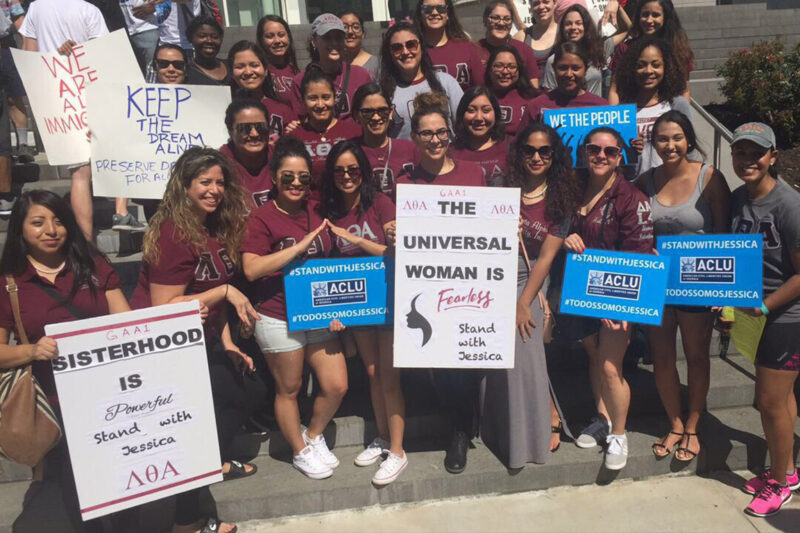Jessica Colotl’s Story Reveals President Trump’s Broken Promise to Protect Dreamers From Deportation


Let’s say you’re a high school or college student or recent graduate who came to the United States from somewhere else as a child. You realized at some point that you aren’t like your friends — you have no permission to live in this country. But this country is all you know. You’ve studied U.S. history, played softball, drunk Slurpees at the 7-11, struggled through the SATs, recited the Pledge of Allegiance. You’re American in every way but the paperwork.
And then the government offers you a deal: As long as you pass a criminal background check and meet certain other conditions, you get permission to live, study, and work here for renewable two-year periods. Suddenly you can pass the same milestones as your friends: You can drive, work, plan for the future.
And then someone new occupies the White House, and suddenly the deal is revoked. You can’t work. You can no longer drive your car. And you could be deported.
That’s what happened to Jessica Colotl, a 29-year-old paralegal in Atlanta.
Yesterday the ACLU and its partners stood up in court to challenge the Trump administration’s arbitrary decision to strip Jessica of her status under the Deferred Action for Childhood Arrivals program.
Jessica’s lived in the United States since her family moved here from Mexico in 1999, when she was 11 years old. She graduated from Lakeside High School in DeKalb County, Georgia, with honors and went on to earn a bachelor’s degree in political science from Kennesaw State University in 2011, where she was named to the President’s List based on her academic performance. She was also a founding member of her college’s chapter of the Lambda Theta Alpha sorority. Jessica aspires to attend law school and become an immigration lawyer, and she has continued to volunteer actively in the community.
Since 2010, the federal government has granted Jessica permission to live and work in the United States in the form of “deferred action.” She’s a Dreamer, a kid who came to this country and made it her home. As former President Barack Obama explained, Dreamers “are Americans in their heart, in their minds, in every single way but one: on paper.” Similarly, President Trump has described Dreamers as “absolutely incredible kids,” who have “worked here” and “gone to school here,” and assured them that they “should rest easy” about being allowed to remain in the country.
But last month, despite President Trump’s promises, the Department of Homeland Security pulled the rug out from under Jessica, revoking her DACA and denying her application to renew her DACA status — with no explanation or chance for her to respond. Jessica had to find out why her DACA was taken from the media, when a DHS spokesperson accused her of having a felony conviction for giving a false address to police after a traffic stop in 2010. For that reason, the government claimed, Jessica didn't deserve DACA anymore.
But the DHS claim is bogus. In fact, Jessica never gave a fake address to the police. That’s why she pled not guilty, and the charge was ultimately dismissed. Jessica has no felony conviction.
Even worse, Jessica was forthcoming about the dismissed charge to the government when she was granted DACA twice before. And indeed — after we filed our lawsuit — the government admitted in a court filing that Jessica does not have a felony conviction. Yet to this day, the government refuses to restore Jessica’s DACA.
Yesterday, we asked the federal court to restore Jessica’s DACA and order the government to give her renewal application a fair look — without the bogus allegation that she’s a convicted felon. The courtroom was filled with Jessica’s supporters from her sorority, law firm, and the local community. Jessica herself was “nervous” but “pretty confident” about how things would go.
The government conceded — as it had to — that Jessica doesn’t have a felony conviction and remains eligible for DACA; nothing has changed since she was granted DACA twice before.
And yet, the government still insisted that DHS was right to strip Jessica of her DACA. In another about-face, the government argued that, under the Trump administration’s new “enforcement priorities,” Jessica is a target for deportation. This is shocking: Anyone who’s met Jessica would tell you she should not be a priority for deportation. Instead, Jessica is someone we should be proud to count as a fellow American.
And in fact, the administration’s own policies say, sensibly, that Jessica and people like her shouldn't have a target on their backs. DHS Secretary Kelly’s memo on priorities specifically exempts DACA recipients. As DHS’s FAQ explains:

Ultimately, the government provided no actual reason why Jessica no longer deserves her DACA. The way it’s treated her flies in the face of President Trump’s promise that Dreamers are safe — and casts serious doubt on whether his administration can be trusted when it says it will do right by them. Is this a sign of a broader break in the deal?
We expect a decision from the court early next week. Jessica left feeling hopeful that she’d get her work permit back and be able to get back to normal life, and that the court will see through the government’s smokescreen, restore Jessica’s DACA, and order the government to give her application for DACA renewal the fair look it deserves. The law entitles Jessica — and every other Dreamer in this country — to a government that lives by its word.

